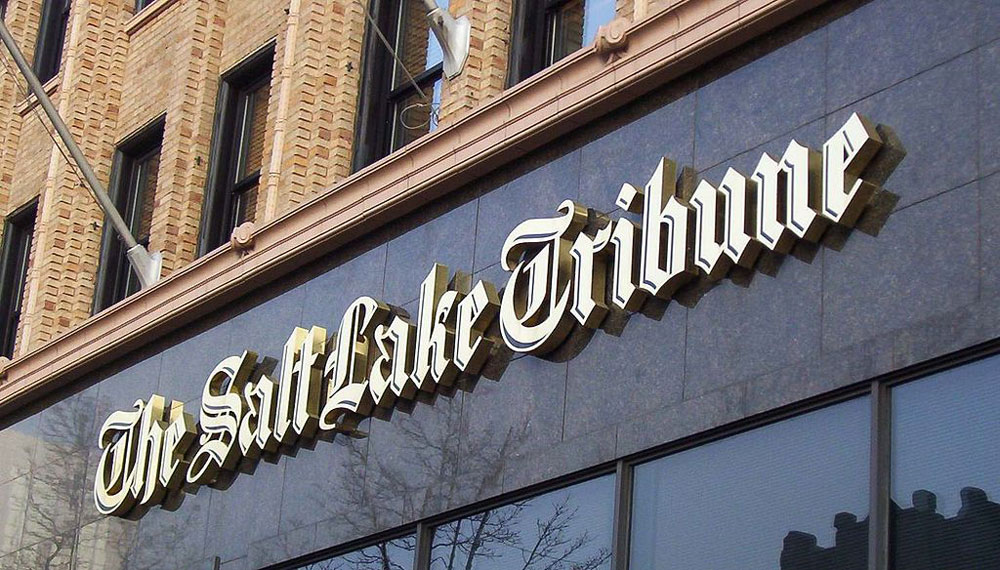
June 3, 2019; Nieman Lab
We want to mark a little time with this newswire by reminding readers that it was not so long ago when the IRS was loath to approve a newspaper as a nonprofit. The reasons for this are summarized below, but now, less than a decade later, it would be surprising to see one rejected. That’s not just because the IRS looks to be approving most comers more generally, but also because nonprofit news sites are no longer anomalies.
“Utah’s Salt Lake Tribune officially submitted its bid to the IRS to become a nonprofit May 30th,” reports Christine Schmidt for Nieman Lab. NPQ reported on the Tribune’s decision to shift to a nonprofit model a few weeks ago. The media outlet is 148 years old and claims a daily readership of about 80,000 people, but, like so many local newspapers, it has had severe financial difficulties of late, with workers facing four rounds of layoffs over the past eight years. Most recently, in 2018, 34 of 90 staff were let go.
In 2016, the Huntsman family bought the paper from Digital First. Digital First—majority-owned by the hedge fund Alden Global Capital—has been, as some NPQ readers will recall, widely assailed for stripping newspapers of assets. In 2018, this led to an open revolt by journalists at the Denver Post and other publications. The Huntsman family’s purchase of the Tribune was widely seen as a move to save the paper. But, as the 2018 layoffs showed, the family has been unable to stem the tide of red ink. And with a joint operating agreement set to expire in 2020, the likelihood of surviving head-to-head competition with the Deseret News was not high.
Can a nonprofit model save the day? As Schmidt points out, simply becoming a nonprofit is no guarantee for survival. The hope, however, is to raise an endowment that can preserve the media outlet “as Utah’s institution, much like our libraries, hospitals and the arts and cultural organizations that enrich our lives and reflect our shared civic goals,” as Huntsman wrote to readers back in early May.
What is being proposed, notes Schmidt, are “two separate nonprofit organizations—one for the Tribune itself and the other as the Utah Journalism Foundation, whose endowment will attempt to support local outlets across the region—most notably the Tribune.” According to Fraser Nelson, the Tribune’s vice president of business innovation, the media outlet aims to raise an initial endowment of $60 million.
Sign up for our free newsletters
Subscribe to NPQ's newsletters to have our top stories delivered directly to your inbox.
By signing up, you agree to our privacy policy and terms of use, and to receive messages from NPQ and our partners.
The Tribune is filing for 501c3 status as an educational entity. Nelson notes that, “Education, according to the IRS and the regulations we’re applying under, includes instruction of the public on subjects useful to the individual and beneficial to the community. That’s journalism in a nutshell, right?”
At one time, such an assertion might have been strongly contested. Back in 2012, NPQ’s Ruth McCambridge quoted Marcus Owens, a former director of the Internal Revenue Services’ tax-exempt organizations division, who noted that the IRS had traditionally felt “that a regular-news newspaper is not educational—that there has to be something more… it hasn’t articulated it, but I suspect the word would be ‘academic’….A regular-news newspaper, typically one that carries advertising, looks and feels like a commercial activity.”
Even then, NPQ questioned this view, observing that in a world where “more and more nonprofit news sites are being explicitly organized for civic education and engagement purposes, the use of revenue streams as the deciding factor seems inadequate as a screen.” Obviously, in many industries—hospitals come to mind—having a similar revenue model as for-profit firms in the field is hardly disqualifying of nonprofit status. Now, with local journalism facing grave financial risks—and following the successful 2016 launch of the Lenfest Institute, which owns the Philadelphia Inquirer—such concerns seem oddly anachronistic.
Even Schmidt acknowledges that “the number of nonprofit newsrooms is growing rapidly.” Media attorney Jeff Hermes tells Schmidt that while some skepticism at the IRS persists regarding the use of the nonprofit model for journalism, it appears to be declining. “Applications used to routinely take a year and a half or more to go through, and that pace has improved,” Hermes notes. To ease the path for IRS approval, the Tribune has promised that as a nonprofit it will no longer make political endorsements in elections.
In terms of the positive case, Nelson contends that, “Newspapers are cultural heritage organizations that record our history. They record the things we care about as a community. They help set an agenda, a geographic sense of who we are as a people … These are the things that create a common web of us, who we are as a people here in Salt Lake and Utah.”—Steve Dubb










